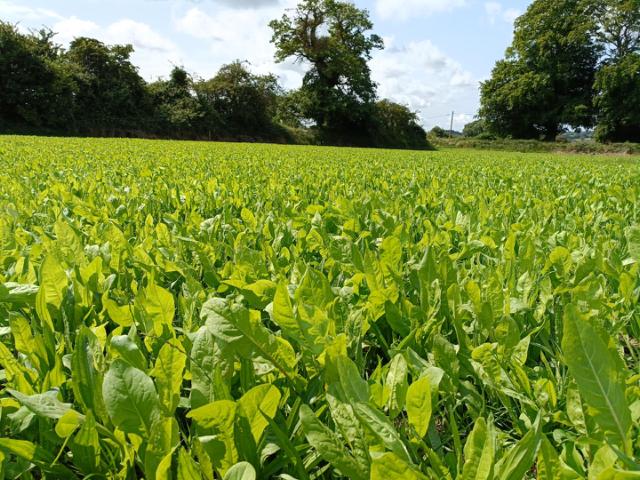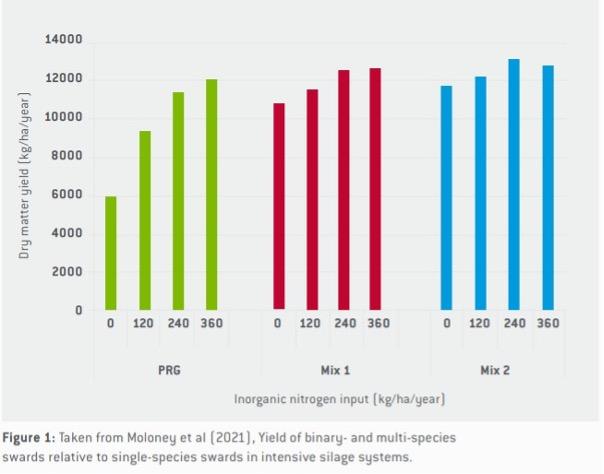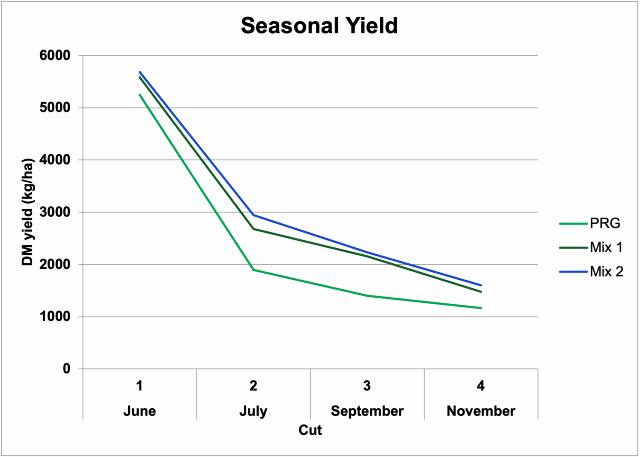
Multi-Species Swards
Multi-species swards have the potential to produce high yields of quality forage at greatly reduced rates of nitrogen fertiliser input.
Why Consider Multi-Species Swards?
A multi-species sward is a mixture of three or more species whose growth characteristics complement each other resulting in improved productivity compared to when each species is grown on their own. The species used typically come from three plant groups i.e. grasses, legumes and herbs, with each species bringing different benefits to the sward. Grasses such as perennial ryegrass and timothy provide strong early-season growth and quality while legumes like white and red clover feed the sward with nitrogen fixed from the atmosphere and boost protein. As well as providing excellent quality, mineral-rich forage in the summer months, deep-rooting herbs like ribwort plantain and chicory are extremely drought tolerant which is an increasing concern for many Irish farmers.

- Multi-species swards can produce similar DM yields to perennial ryegrass swards at significantly lower rates of inorganic N fertiliser. This could be worth up to 5 bags of CAN/acre.
- The inclusion of warm-season species like chicory and plantain mean multi-species swards have strong summer production compared to a grass sward. Furthermore, these deep-rooting species make the sward much more tolerant of drought than a grass sward.
- Multi-species swards are a source of highly digestible, high protein forage and can maintain their high quality throughout the growing season.
- The inclusion of legumes and mineral-rich herbs provides a more balanced diet than a grass sward with species like chicory also providing some anthelminthic benefits to grazing livestock.
- The use of multi-species swards compared to grass-only swards in agriculture can also provide a wide range of environmental benefits including:
- Reduced N2O emissions and nitrate leaching associated with reduced fertiliser use.
- Higher rates of carbon sequestration due to deeper root-depths
- Enhanced biodiversity, particularly pollinators feeding on the variety of flowering plants in multi-species swards.

Establishing a Multi-Species Sward
Multi-species swards can be sown any time between late spring and early autumn. Ideally soil temperatures should be around 10°C for successful germination and establishment.
Optimum soil fertility is required to maximise production and soil fertility guidelines for grass swards regarding soil pH, P and K levels should be followed for multi-species swards.
The conventional method of burning off the old sward, ploughing etc… is the most effective way to establish a new multi-species sward resulting in a greater abundance of sown species and less weeds. This is important as we cannot apply any herbicide on multi-species swards as the herb portion is not resistant to herbicide. The small seeds of clover, plantain and chicory require shallow sowing (~1 cm). This also means rolling the seedbed to ensure good soil-seed contact is a crucial step in establishing a multi-species sward from scratch.
Oversowing legumes and herbs into an existing grass sward represents an economical alternative method for establishing multi-species swards. It is critical however, to address any weed issues in the field before oversowing. Alternatively, choose a field with a low weed burden in which to oversow. Species like white clover, plantain and chicory should be oversown at between 1.5 and 2kg/acre each.
As with any oversowing operation it is important to reduce competition from established plants by sowing into an open sward in which soil-seed contact can be made and light can reach the new seedlings. This can be achieved by oversowing after a silage cut or after tight grazing. Continuing to graze for 7 – 10 days after oversowing can further reduce grass growth and promote germination and establishment of the new seeds.
Once there is good establishment from the grass, legume and herb portions of the mixture there should be minimal opportunity for weeds to establish. The similarity in growth habit of herbs like plantain and chicory to common grassland weeds like docks, means that once these species get established there is no space in the sward for docks and other broadleaf weeds. Small outbreaks of weeds can be spot-sprayed if necessary.
Your new multi-species sward should be ready for its first grazing 6-8 weeks after sowing or when there are 7 true leaves on your chicory and plantain.
Choosing The Correct Multi-Species Mixture
Multi-species swards are often thought only suitable for good quality, dry land. However, by selecting species that are better able to cope with wet or dry conditions we can formulate different mixtures to suit different soil types.
A good starting point is a mixture of species that will perform on a range of soil types like perennial ryegrass, white clover and ribwort plantain. Once we have this foundation the mixture can be tailored towards dry or wet soils.
In particularly light, dry soils adding species like festulolium, cocksfoot, lucerne and chicory will help keep the sward productive during prolonged dry periods.
On the other hand, in heavy, wet soils species like timothy, meadow fescue and plantain are well equipped to cope with such challenging conditions.
A mixture like DLF’s 6 Species Herbal Ley is a good all-round mixture that should produce large amounts of quality forage across a range of soil types.
Managing Multi-Species Swards
Grazing a Multi-Species Sward
Multi-species swards can produce high yields of quality forage with potential for excellent animal performance when managed correctly. The management guidelines for grazing multi-species swards are similar to grass swards with quality directly related to the proportion of leaf and stem. However, there are a couple of important points to remember when grazing multi-species swards.
- Rotational grazing will lead to better sward quality, utilisation, and persistence than continuous set stocking.
- Providing animals access to paddocks for a short time (1 – 3 days) will help maintain sward diversity by preventing the selective- and over-grazing of more palatable herb species.
- It is important to provide a sufficient rest period for multi-species swards to recover from grazing. Allowing 21 – 28 days between grazing will improve persistence without reducing forage quality.
- The greatest benefits of multi-species swards compared to ryegrass swards occur in summer when grass swards are less productive.
Silage and Multi-Species Swards
Multi-species swards are often thought as better suited to grazing than silage production. While this may be the case, Teagasc studies have found multi-species swards to ensile equally as well as grass swards.
- Multi-species swards typically have a lower DM content than grass swards due primarily to the presence of legumes.
- It is therefore recommended that multi-species swards for silage are cut in dry conditions and allowed a sufficient wilt period to improve the chances of successful preservation as silage.
- Silage additive application may also improve preservation.
Nitrogen fertiliser application
One of the biggest attractions of multi-species swards is their potential to reduce the requirement for nitrogen (N) fertiliser. Many studies have reported multi-species swards receiving little or no N achieving similar yields to grass swards receiving ~300kg N/ha per year. Achieving such an outcome on-farm will depend on maintaining a decent proportion (20-30%) of legumes in the sward. Regular grazing will help to encourage and maintain clover in the sward.
Large applications of N will have a negative effect on legume persistence; however, a small amount in spring can be useful to feed grass and herb species before legumes begin N fixation in summer. In this case up to 50kg N/ha early in the growing season should not have a significant negative effect on legume persistence.
Persistence
Persistence is often highlighted as a weakness of multi-species swards with a chance of the herb content significantly reducing after 3 or 4 years. If you plan to sow a multi-species sward then you must acknowledge that it is different to a grass-only sward and thus may not persist in the same way. This perceived weakness should not be seen as an obstacle as the savings in fertiliser, diesel and time accumulated over the lifetime of a multi-species sward will far outweigh the cost of oversowing plantain and chicory every few years. As we saw in the case of Kevin O’Hanlon, oversowing clover and herbs is possible and once established the savings in N can be substantial.
At worst you will be left with a grass-clover sward and a much smaller fertiliser bill!